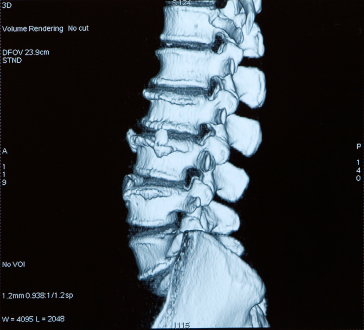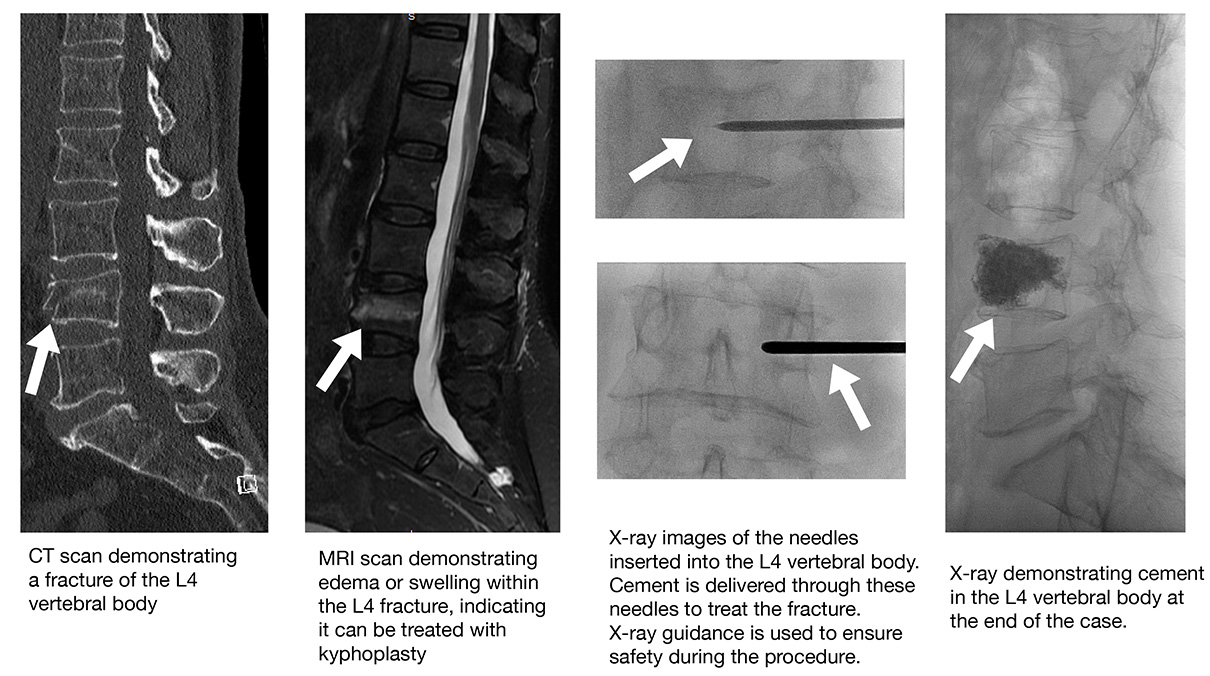Kyphoplasty
Kyphoplasty is a minimally invasive procedure done under moderate (“twilight”) sedation where we create a cavity in the vertebral body then deliver bone cement to fortify the fractured vertebra.

What is kyphoplasty?
Kyphoplasty is a minimally invasive procedure done under moderate (“twilight”) sedation where we create a cavity in the vertebral body then deliver bone cement to fortify the fractured vertebra. Almost all of our patients have severe back pain (≥ 6/10) requiring narcotics for pain relief, about a third needs to be hospitalized for pain control. In carefully selected patients, about 90% would get significant pain relief after kyphoplasty. Most are able to get off narcotics after kyphoplasty and resume a normal life. It can also save lives. One recent analysis of medicare patients showed that kyphoplasty significantly reduces mortality rate compared with non-operative management. This study also demonstrated that vertebroplasty — a similar procedure where cement is delivered without cavity creation — also lowers mortality rate, though to a lesser degree compared to kyphoplasty.
Consider consultation for kyphoplasty if you experience the following:
- Back pain following a fall or minor injury that does not go away after 2 weeks
- Back pain that wraps around the chest or abdomen (axial back pain)
- Severe pain (≥ 6/10) limiting ability to carry out normal activities of daily living
- Pain requiring narcotics use
You will be assessed by our advanced practitioners in our clinic. In addition to clinical assessment, we also obtain an MRI or bone scan to determine if kyphoplasty is indicated. In the absence of bone bruise (marrow edema) on MRI or activity on bone scan, kyphoplasty is not effective and, therefore, is not recommended.
It is important to tell the doctor about allergies and medications that you are currently taking. Certain types of medications such as blood thinners may need to be stopped for a short time prior to the procedure. You will also not be able to eat or drink anything for a few hours before the treatment except for sips of water to take medication. Wear comfortable clothing and be sure to bring someone to drive you home as you will be discharged the day of the procedure.
Kyphoplasty is an outpatient procedure performed at Novant Health Presbyterian Medical Center. You will meet with the physician prior to the procedure to review the plan and answer any questions you may have. IV sedation will be administered before and during the procedure to help keep you relaxed and comfortable. The physician will insert a needle through your skin into the fractured vertebra under X-Ray guidance. Cement will be delivered into the fracture and then the needle will be removed. A bandage will be placed on the skin but no stitches are required. The procedure usually takes about 30-45 minutes unless there are multiple fractures that require treatment. You will then be observed in the recovery room for 2 hours prior to discharge home.
Our goal is to get our patients off narcotics and help them return to normal life. The majority of our patients experience immediate pain relief after kyphoplasty. In some patients, full relief may take up to 2 weeks. Most patients no longer need narcotics after kyphoplasty. A small minority of patients (about 10%) get little to no relief from kyphoplasty. For these patients, we would consider alternative therapies such as gray ramus communicans injections.
We will work with your primary care doctor to evaluate you for osteoporosis. If you are diagnosed with osteoporosis, we will refer you to a specialist to initiate osteoporosis treatment, which can reduce the risk of recurrent VCF by more than 50%.
Our fellowship-trained interventional radiologists have extensive experience with minimally invasive spinal interventions and have one of the busiest kyphoplasty practices in the region. We perform all our kyphoplasties in a state-of-the interventional suite at NOVANT Presbyterian and Rowan Medical Centers where we can offer safe interventions even in the most complex cases.
Request a consultation today:
One of our expert Interventional Radiologists will personally review your case with you, and discuss whether an intervention is the right option for you.
Patients, please note that services may require a referral from your primary care or another provider, but we can help facilitate that process if treatment is deemed necessary. Telehealth consultations may be available depending on the type of procedure required.


